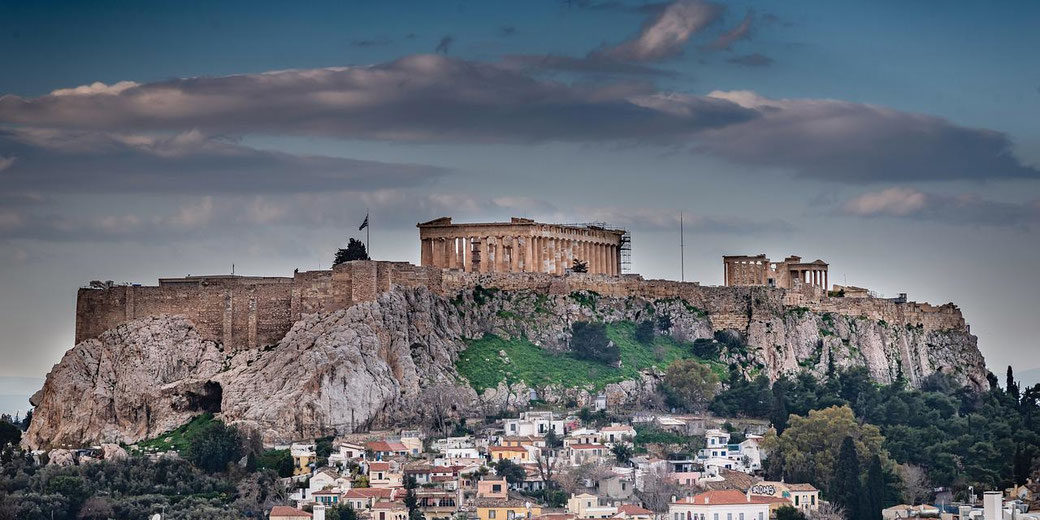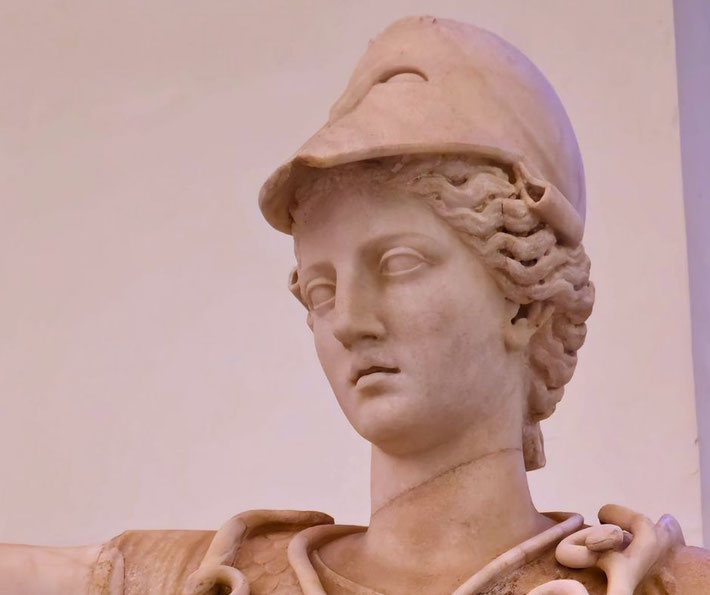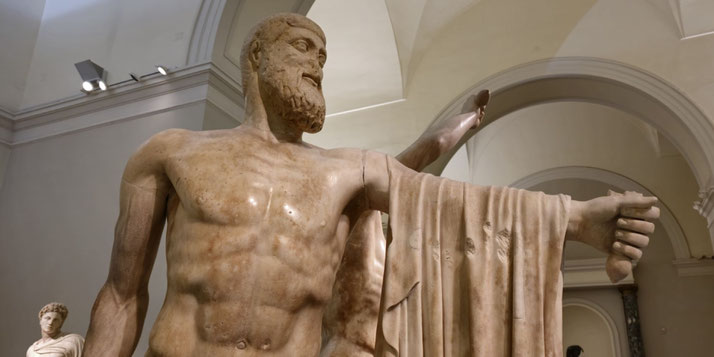The rise and fall of ancient Athens

Ancient Athens was a city located in the centre the Attica region of Greece. Nestled between the mountains and the sea, this city would grow to be a powerhouse of culture, politics, and military might.
In this article, we will explore the early history of ancient Athens, from its earliest inhabitants to the rise of the first Athenian democracy.
We will examine the major political and social changes that took place during this period, as well as the important figures and events that shaped Athenian society.
Mythical origins of ancient Athens
According to legend, the Athenian King Cecrops was the first ruler of Athens. He was a half-man, half snake-like creature.
During his reign, a contest was held among the gods on the Acropolis to determine who would be the patron deity of the city.
Poseidon, the god of the sea, struck the ground with his trident and created a spring of water.
Athena, the goddess of wisdom and warfare, planted and grew an olive tree.
Cecrops decided that the olive tree was the superior gift to the city, as it could be used for food, medicine, and its oil could be used for fuel in lamps.
Therefore, Athena was named the patron goddess of Athens. The main temple on the Acropolis, called the Parthenon, was dedicated to her and it became the most important religious building in the city.
At some later time, Theseus, a legendary hero and king of Athens, is then credited with the synoikismos, or political unification, of Attica into a single state with Athens as its capital.

The archaeological evidence of early Athens
Aside from the myths told about Athen's early years, archaeologists have tried to piece together how the city originally developed.
As far as can be determined by the evidence, the site of the city of Athens had been inhabited by people since at least the Neolithic Period, from around 3000 BC.
However, the earliest structures found by archaeologists were built around 1400 BC in the Late Bronze Age.
It was at this time that the Acropolis (a word that means 'high city') had defensive walls built around it by the inhabitants.
Following this, the township of Athens developed around the base of the Acropolis, where water wells and domestic houses have been discovered.
After the Greek Dark Age ended, around 800 BC, the population of Athens, and its surrounding region of Attica, grew substantially.
How Athens became wealthy
The region of Attica, where the city of Athens was located, had relatively poor farmland, which meant that the Athenians had to trade with other city-states in order to obtain enough food once its population became too big.
One of the most important products that Athens traded for food was silver, which was mined in a region south-east of Athens, called Laurium.
The silver mines were controlled by the Athenian aristocracy, and the profits from these mines helped to finance the construction of public works, such as temples, and the Athenian fleet.
Despite the poor soil, some agricultural crops did grow well in Attica, which included olives, figs, and grapes.
As a result, these goods become key exports for Athens, either in their raw state, or as products, such as olive oil and wine.
The dramatic political changes within Athens
The early history of Athens is closely linked to the development of democracy in Greece.
However, before Athens became democratic, it was ruled by powerful aristocratic families.
Greek historians claimed that these families used their political power to oppress the poor citizens of the city through unjust laws.
Therefore, a series of lawmakers were chosen to try and create fairer rules.
The first great lawmaker of Athens was a man called Draco. He famously introduced a set of harsh laws around 621 BC that were so severe that they became known as the “Draconian code”.
Under his code of laws, most crimes were punishable by death.
As was to be expected, Draco's laws were quickly abandoned or revised, as they were considered to be too impractical.
However, the concept of having a system of laws that applied to everyone still remained popular.
Solon was an Athenian statesman who lived in the late 7th and early 6th century BC, who was the city's second great lawmaker.
He sought to reduce the harshness of Draco's laws, and he is best known for his legal reforms, which aimed to create a more equitable society.
In particular, Solon's legal reforms included measures to alleviate the burden of debt on the poor, such as banning enslavement for debt.
Who were the tyrants of ancient Athens?
Following from Solon, Athens was ruled by a series of tyrants, the most famous of whom was Peisistratus.
Peisistratus came to power in 561 BC and ruled Athens for many years. His children would also take charge of Athens, and his family was known as the Peisistratids.
Peisistratus' time in power is generally considered to be peaceful, and he initiated a number of public works projects, such as the construction of temples and the planting of more olive trees.
Even though he was a tyrant, in the sense that he had supreme power in the city, he didn't treat the Athenians very harshly.
This would change, however.
Peisistratus' son, Hippias, took over from his father after Peisistratus' death in 528 BC.
Hippias was a very different ruler to his father, and he ruled Athens with an iron fist.
Consequently, he became increasingly unpopular with the Athenians. In 510 BC, an Athenian revolt began, as the people of the city wanted to rid themselves of Hippias.
To achieve this, the Athenians asked for military assistance from the Spartan king, Cleomenes I, who happened to be nearby with an army.
With Cleomenes' help, the Athenians were successful in expelling Hippias from Athens.
In response, Hippias fled to the Persian empire in the hope of raising an army to return to Athens.
Once Hippias was gone, Cleomenes placed a pro-Spartan tyrant in charge of Athens, called Isagoras.
However, Isagoras also became unpopular, and the Athenians feared that Sparta was beginning to take control of the city.
In response, the population of the city trapped Cleomenes, Isagoras and their men on the Acropolis for three days until they agreed to leave the city permanently.
Once Cleomenes and Isagoras had left Athens, the Athenians turned to another person to lead them: Cleisthenes.

Cleisthenes and the birth of Athenian democracy
Cleisthenes was another aristocrat, but he was also a reformer; he is credited with the birth of democracy in Athens in around 508 BC.
The word “democracy” comes from the Greek words demos, meaning “people”, and kratos, meaning “power”. So, democracy is literally “power to the people”.
Under democracy, all male citizens have an equal say in the running of the city.
Decisions are made by majority vote, and everyone had the right to participate in the political process.
Unlike under the tyrants, robust political discussion was encouraged in a democracy.
As a result, the marketplace, known as the 'agora', became an important part of the city where all people could exchange ideas.
The agora itself was a public square, which was surrounded by administrative buildings, and was located to the north-west of the Acropolis.
It was both the political and commercial centre of city life. Wealthy Athenian men could spend much of their day in the agora, since a lot of people gathered there to buy goods.
To create a democratic system, Cleisthenes introduced a number of reforms that increased the power of the people in Athens.
He created new administrative units called demes. The demes were small communities which were each responsible for electing their own representatives to the Athenian assembly.
Cleisthenes' reforms meant that the Athenian assembly became more representative of the people, and it also gave ordinary citizens a greater role in the political process.
However, in Athens, only male citizens could participate, which mean that women, metics (foreign traders living in Athens), and slaves could not.
In reality, this meant that most of Athens’ population were not part of this democracy.
By the 5th century BC, Athens had an estimated population of around 250,000 to 300,000 people, including citizens, metics, and slaves.
Of these, only about 30,000 to 60,000 could participate in the democratic process.
Democratic political structures
Free adult male citizens could participate in democracy as part of three main political bodies: the Assembly (also known as the ecclesia), the Council (also known as the boule), or the law courts.
The Assembly was the most important group in the city. Every citizen was able to participate in proposing new laws and to vote on their implementation.
The Assembly met every nine days at a location called the Pnyx, to the south-west of the Acropolis.
The Pnyx was a raised platform that was used for the different speakers who were proposing or challenging laws.
As a result, politicians who could speak persuasively were the most influential in the city.
The decisions made by the Assembly became binding laws on the Athenians.
Next, the Council was a body composed of 500 citizens (50 elected from each of the 10 tribes), who met daily in a building called the Bouleuterion, located on the western edge of the agora.
The Council's main job was to prepare the topics to be discussed at the Assembly, and to oversee the day-to-day administration of Athens.
Members of the Council were paid for their work, which meant that even poor people could take part.
While the Council had a chairperson, the person who held that role changed each day to avoid any one person having too much power.
In addition, the law courts were where Athenian citizens could have their legal concerns heard by a jury in order to seek justice.
The jury was comprised of other citizens who were paid to attend. The selection of which citizens would become jurors was looked after by a device called a kleroterion.
This device contained all of the names of the people, who were then chosen at random from it.
Also, the number of people chosen were always an odd number so that votes on legal cases would never be a tie.
There were no judges or lawyers in Athenian courts, so people would have to speak on their behalf.
When deciding on punishments for crimes, both the prosecutor and the accused could propose a suitable punishment and the court would vote on which to implement.
To further ensure that no one person could become a tyrant in Athens again, a system of 'ostracism' was introduced.
Ostracism allowed the Assembly to vote on exiling any politician who was considered a threat. Their exile from Athens would last for ten years.
Another important group at this time were the generals (strategoi). The Assembly chose ten leaders to command the army and navy who could serve for multiple years at a time so that they could develop the necessary experience required to defend Athens and its interests.
Any citizen could be elected in these roles if they had military experience. Over time, the ten generals became influential figures and were frequently re-elected.
The Greco-Persian Wars
In 490 BC, the Persian Empire invaded mainland Greece. The Persians had already conquered much of the known world, and they now turned their attention to the Greeks.
The Persians were met by a coalition of Greek city-states, led by Athens. The Greeks were heavily outnumbered, but they were able to defeat the Persians at the Battle of Marathon.
However, the Persians returned ten years later, in 480 BC. This time, they were met by a larger Greek force, led by Sparta.
The Greeks were again outnumbered, but this time were defeated by the Persians at the Battle of Thermopylae.
The Persians then captured, sacked, and burnt Athens to the ground. However, the Athenians refused to give up, and they defeated the Persians once again at the naval Battle of Salamis.
This was a turning point in the war, as it showed that the Greeks could defeat the mighty Persian Empire.
After their victory at Salamis, the Greeks went on to win another major victory at the Battle of Plataea in 479 BC.
This finally ended the Persian threat to Greece, and it ensured the survival of Greek city-states.
Athens and the creation of the Delian League
After their victory over the Persians, a number of Greek city-states formed a military alliance called the Delian League.
The league was originally formed to free Greece from Persian rule, but it soon became clear that the league had another purpose.
The Athenians utilized the league to build up their own power and influence. They did this by drawing upon the league's funds to build a massive navy, which they used to control the seas around Greece.
By 470 BC, Athens was the greatest sea power in Greece.
This made Athens one of the most powerful empires in the Mediterranean world, and it also made them very wealthy.
The Athenians used their wealth to build some of the most impressive buildings in the ancient world, including the Parthenon.
As a result, this period of time in Athens' history is known as its 'Golden Age', and some of the most famous ancient Greeks lived in the city during this time.
War with Sparta: The Peloponnesian War
After their victory over the Persians, the Greeks entered a period of peace and prosperity. However, this was not to last.
Despite their wealth and power, the Athenians were not able to maintain control of their empire.
The tensions and disagreements between Athens and Sparta had been building for a while, with both cities pursuing aggressive foreign policies that ultimately led to conflict.
In 431 BC, Athens and Sparta went to war with each other in what is known as the Peloponnesian War.
The war began because Athens had interfered in a dispute between its allies and those of Sparta: Corinth and Corcyra.
The Corinthians appealed to Sparta for help, and Sparta declared war on Athens.
This conflict was fought between two alliances: the Delian League, an alliance led by Athens; and the Peloponnesian League, an alliance led by Sparta.
The war lasted for 27 years, and it ultimately ended with the defeat of Athens.
After the completion of the Peloponnesian War, Athens was ruled by a pro-Spartan oligarchy known as the 'Thirty Tyrants' for a brief period of about eight months before democracy was restored.

The legacy of Ancient Athens
After their defeat in the Peloponnesian War, Athens would never again return to the power and prestige they once had.
Regardless, they would be remembered for centuries due to their important innovations in democracy, philosophy, and drama.
In fact, Athens became famous for being the home of some of the most influential philosophers in history, including Socrates, who questioned traditional values and laid the groundwork for Western philosophy; Plato, who founded the Academy; and Aristotle, who tutored Alexander the Great.
To a lesser extent, Athens also had an enduring reputation for producing renowned playwrights like Aeschylus, Sophocles, and Euripides.
Their tragedies explored complex themes of fate, justice, and the human condition, while Aristophanes' comedies provided satirical commentary on contemporary Athenian society.
Ultimately, the influence in the foundation of democracy, and their developments in philosophy and literature is still important in modern times, and it went on to shape the course of Western civilization.
Further reading
What do you need help with?
Download ready-to-use digital learning resources
Copyright © History Skills 2014-2025.
Contact via email
With the exception of links to external sites, some historical sources and extracts from specific publications, all content on this website is copyrighted by History Skills. This content may not be copied, republished or redistributed without written permission from the website creator. Please use the Contact page to obtain relevant permission.





